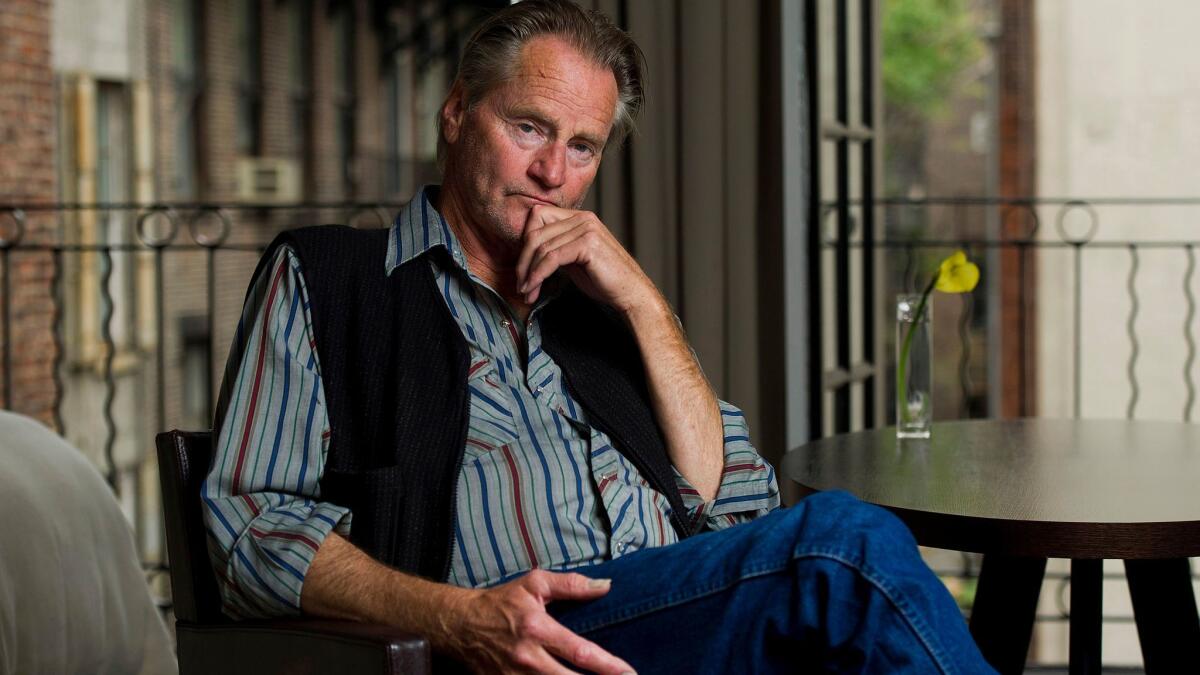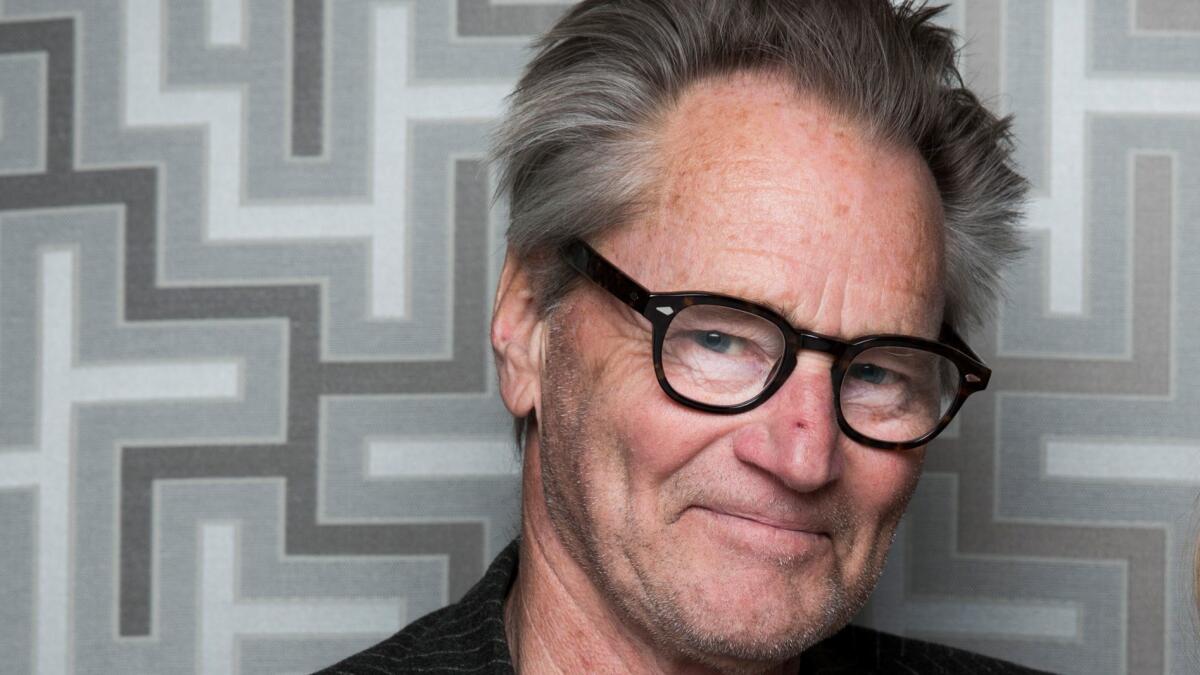Appreciation: Sam Shepard, the cowboy playwright who rewrote the rules of the American stage

- Share via
Eugene O’Neil brought gravitas to the American theater. Tennessee Williams allowed it to lyrically sing. Arthur Miller raised its political temperature. And Edward Albee infused it with an absurdist flair.
But it took Sam Shepard, the greatest playwright to emerge from the economically strapped, artistically fertile off-off Broadway movement launched in the 1960s, to make the American theater finally seem cool.
Shepard, whose death from complications of Lou Gehrig’s disease at age 73 was announced Monday, may be remembered by the entertainment media as the handsomely chiseled film star who was long linked romantically to Jessica Lange. But his enduring legacy exists as the author of such emotionally naked, dreamlike dramas as “The Tooth of Crime,” “Curse of the Starving Class,” “Buried Child” (awarded the Pulitzer Prize for drama in 1979), “True West,” “Fool for Love,” and “A Lie of the Mind.”
Not everyone will agree with my assessment that he was America’s best dramatist since Williams. But as someone who has taught playwriting for years, I can say that, if Samuel Beckett has been the god of modern theater, Shepard has been the more accessible demigod who has inspired more young talents in the last few decades than any other.
An American original who carefully burnished an image as a writing cowboy, Shepard flirted with categories only to elude them. He may have looked like a rodeo star, but he was a natural avant-gardist with a deep existentialist streak.
Born in Illinois and raised in Southern California, he came of age creatively in the early 1960s in Greenwich Village. Carrying the American West on his back, he immersed himself in the fusion of radical new developments in jazz, rock ‘n’ roll, comedy, poetry, the visual arts and, yes, eventually, even the theater, which was about to relinquish its longstanding reputation as a cultural laggard.
Shepard traveled to New York with a touring troupe he joined after seeing a newspaper ad during his stint as a delivery boy in Pasadena, a job he took after working as ranch hand around Chino. Acting was his way out of the cultural desert.
He was still a teenager when he arrived in New York. “I was knocking around, trying to be an actor, writer, musician, whatever happened,” Shepard recounted to the Paris Review. He bunked with a group of musicians, one of whom was the son of jazz great Charles Mingus, and worked as a busboy at the Village Gate, a nightclub in the center of the downtown ferment. It wasn’t long before he fell in with a crowd that was presenting plays that behaved more like rowdy performance collages than literary dramas.
Why shouldn’t theater artists pose as direct an assault on the senses as a Charlie Parker jazz riff or a Janis Joplin wail or a Jackson Pollock action painting or a Lenny Bruce harangue? Shepard didn’t see why he should have to choose between Beckett and Bob Dylan, and lucky for him, countercultural rebels were busy dismantling these obsolete divisions.
The burgeoning off-off-Broadway scene that included Caffé Cino, the Judson Poets’ Theater, La MaMa and Theatre Genesis cared less about resumes and training than about raw expressivity and dangerous passion. The bar to entry wasn’t high if you had conviction. Playwrights who were baptized in these waters — Lanford Wilson, Maria Irene Fornés, Terrence McNally, Jean-Claude van Itallie — went on to change the course of contemporary drama, and Shepard rose quickly to the head of this thrillingly insubordinate class.
“Sam was an exciting central figure in our young Greenwich Village ’60s revolutionary theater,” van Itallie wrote to me after the news broke of Shepard’s death. “A marvelously intuitive and imaginative playwright and friend, he languaged the times.”
The critic Richard Gilman, recalling Shepard as a young man absorbing the example of director Joseph Chaikin at the Open Theater in 1965, writes of “a James Dean-like youth with an un-Dean-like intellectual glint in his eyes.” Chaikin, who was conducting vital theatrical research on the presence of the actor and the revitalization of ritual, had a massive influence on the development of Shepard’s playwriting imagination. Gilman points to “transformations,” exercises in which improvisations were rapidly changed to build agility, suppleness and ensemble unity, as a crucial link between these two figures.
He may have looked like a rodeo star, but he was a natural avant-gardist with a deep existentialist streak.
An outlaw who has become part of the mainstream, Shepard is now ensconced in the theatrical canon, but it is still difficult to find a vocabulary that can precisely account for his theatrical brilliance. “A play’s like music — ephemeral, elusive, appearing and disappearing all the time,” Shepard told American Theatre magazine in a remark that illustrates the critical challenge.
Most theatergoers know the great family plays (“Buried Child,” foremost among them.) There are some who see his earlier and more experimental efforts as a long apprenticeship that finally culminated in this series of domestic dramas, in which the author is confronting the memory of his brutal, alcoholic father.
This is a rather simplistic way of appreciating a playwright whose career doesn’t lend itself readily to a narrative of progression. The aesthetic experimentation isn’t something Shepard graduated from. “True West” and “Fool for Love” are still driven more by subjective emotion than by plot, still play fast and loose with time, and still believe that “character” is something that we invent for each other rather than a vessel that we sail safely inside of on the journey from cradle to grave.
Shepard will be remembered for the way he took pop cultural myths on a modernist ride, for his deconstructions of the American dream and the fame game it has everyone ruthlessly playing and for the leap in our understanding that character is more mercurial and performative than psychological realism would have us believe. But I cherish Shepard above all for the way he transformed the wounds of the male psyche into concrete theatrical sounds and images that could cut through the habitual untruths that deaden not only our theater but our lives.
Fathers breaking down doors, husbands bearing down on their wives, a brother urinating on his sister’s artwork, a lover lassoing a rope while brooding about his forbidden beloved — Shepard revealed the divided hearts of men, longing for connection while coveting their independence, forced into battle and yet unable to stop fighting once they’ve returned home. The formal adventurousness, which continued throughout his somewhat less successful later plays, banished sentimentality and forestalled psychological self-indulgence.

SIGN UP for the free Essential Arts & Culture newsletter »
Like all great artists, Shepard told us our story as he was transfiguring his own. The social dimension of his work, he insisted, was secondary to the existential conflicts animating his dramas. But the prism through which he viewed the human tragicomedy was unmistakably American. No playwright of his generation has managed to put more of our cultural life onstage.
Shepard thought imagistically, and I have seared in my mind the image of him laughing uproariously with Lange as they watched Martin McDonagh’s “The Lieutenant of Inishmore” at the Atlantic Theater Company in New York. It’s no surprise that he was as responsive as an audience member as he was as a playwright.
A final image: Walking home from the New York Public Theater after seeing a revival of “Action,” a Shepard play in which characters speak and act in ways that will frustrate anyone expecting a comprehensible story to emerge, I turned to my significant other at the time and tried to explain the problem I had with the production in language that was so incoherent and non-sequential that the two of us laughed all the way home at just how accurately Shepard had nailed our condition.
Follow me @charlesmcnulty
MORE ON SAM SHEPARD:
Obituary: Pulitzer winner dies at 73
The biggest entertainment stories
Get our big stories about Hollywood, film, television, music, arts, culture and more right in your inbox as soon as they publish.
You may occasionally receive promotional content from the Los Angeles Times.








